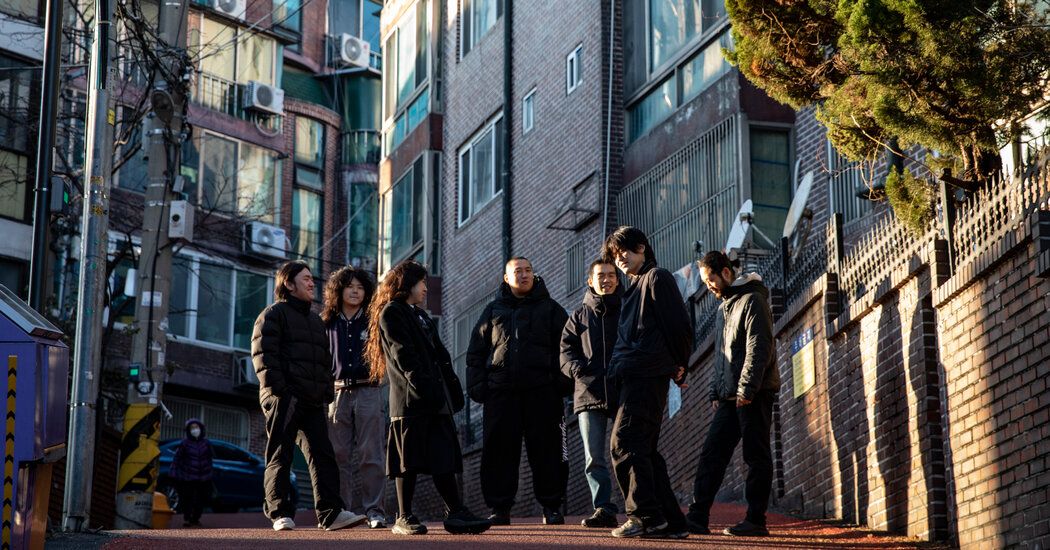What comes to mind when you hear the word “K-pop”? Is it the global boy band phenomenon BTS, wearing studded jackets and dancing in perfect synchronicity? Or girl group Blackpink, performing at Coachella in trendy fashion and perfectly curled hair?
How about an “indie music collective” of casually dressed people crowded around a mixing desk in a one-room studio outside a Seoul restaurant specializing in fried chicken?
“Give me some more bass,” said Omega Sapien, a vocalist with electric green hair and grills, swaying his hips and growling to the beat. The studio was filled with art, vinyl records, weights, and other odds and ends. Another singer lay face down nearby, severely hungover.
For Balming Tiger, this is everyday life as an alternative K-pop band. His music, a fusion of various genres, from electro to hip-hop, is funky and avant-garde. Their unkempt and dirty appearance is far from the professional style of the groups that most of the world associates with K-pop.
But they also claim that label. K-pop is any music that comes out of South Korea, according to Omega Sapien. “Everything in that area is K-pop,” he said.
It is?
“K-pop” is an abbreviation for Korean popular music, but it is often understood to mean something more specific: boy bands and girl groups whose members are known as idols (in part because of their fiercely devoted fans). Their music tends to have a formulaic structure and performances are tightly choreographed. The management companies invest millions in these acts and exercise strict control over the final product.
But in South Korea it is not the most popular type of music. Idol groups are vastly outnumbered by independent and alternative artists, according to government and industry data. Hyukoh, a four-member band from Seoul's trendy Hongdae neighborhood, and Leenalchi are two other well-known local alternative groups.
“Nowadays, I have the feeling that when most people hear the term K-pop (and by 'most people' I mean people all over the world and not just in Korea) they often just think in girl groups and boy bands that fit in. a particular mold,” said Regina Kim, a New York-based journalist who writes about Korean pop culture. When she was growing up in New Haven, Connecticut, Kim said, South Korean R&B and dance music were also considered K-pop.
In 2023, nearly a quarter of South Koreans will attend a live concert, online or offline, by an independent artist, according to a survey by the Korea Creative Content Agency. The same report found that ballads, not pop by idol groups, were the country's favorite genre, with more than half of respondents identifying that slower-paced, less flashy category as the one they listened to most.
Although Balming Tiger identifies as K-pop, they do not consider themselves idols. “Even if we wanted to be like idols, we can't,” said Chanhee, a vocalist who also works on the group's styling, videos and photography.
“It's our imperfections that actually make us more attractive,” said another vocalist, Sogumm, one of the group's two women. “I want people to see us and think 'K-pop is cool,' not just in the context of being pretty and handsome, but being something that appeals to a diverse audience.” It's not the staggering levels of fame they seek, but rather a broader acceptance of their version of K-pop. They are already succeeding in many ways, having just wrapped up a tour of Europe, Asia and America late last year, all without the financial backing or marketing power of Seoul's big entertainment companies.
Balming Tiger (the name comes from Tiger Balm, a Singaporean ointment) started as a party team, hosting DJ events throughout Seoul.
Little by little, singers and producers joined in and evolved into a full-fledged stage act. Chanhee and Omega Sapien left school to dedicate themselves to the group full time. (“At first, I lied to my mother that I had to take a break from school to go to the army,” Chanhee said.) They released their first album in 2021.
A popular origin story like that is practically unheard of in the idol world. The vast majority of them audition for a management company and then, if they make it, they undergo rigorous training that can last for years.
The authority of companies over groups goes beyond music. Many idols are told what they can and cannot say in public; sometimes their diet is even controlled. Some idols have said they were told not to date because their most devoted fans would feel upset or betrayed if they did.
Marketing works, said Daniel Anderson, a K-pop writer who lives in Seattle. Many fans are attracted to the personas that companies create for idols. “They know how to build and construct these stories,” he said.
“People will latch on to these narratives that might be genuine, but a lot of times these images are crafted,” Anderson said. “What they wear, what they say, who is the funny one, who is the introvert.”
But at the same time, he said, “fans want these idols to be more authentic.”
Some K-pop observers say its unwavering value system reflects a broader social pressure in South Korea that allows for no mistakes. The results can be convincing, as journalist Kim pointed out. “Watching a K-pop music video often feels like you're watching a short Hollywood movie with high production value, incredibly beautiful people, and incredible choreography,” she said.
But in recent years so many idol groups have entered the market that it's becoming harder to stand out, said Shin Cho, domestic marketing director and head of K-pop and its Japanese counterpart, J-pop, at Warner Music Korea.
“People were outdoing each other on the 'perfect' scale,” Cho said.
One way to stand out in that environment could be to do things yourself. The Balming Tiger “collective” has 11 members, including people behind the scenes: producers, a writer and cameramen. The music, videos and choreography are all his.
For the main dance move of one of their songs, “BuriBuri,” they simply stretch their arms out to the sides and move their hips. “This is not something that professional choreographers would have thought of,” Omega Sapien said during a rehearsal in December. “It's organic and comes from us. Is better.”
The group members, back in their usual haunts, are now performing in South Korea and working on new music. Whatever it sounds like, they will consider it K-pop.
“K-pop has an advantage, which is what is making its way into the market,” Omega Sapien said. “We are adding a different layer to that advantage, which will be our legend and our asset that we pass on to future generations.”












